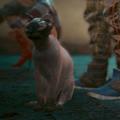Ursula Le Guin's grand utopia
4 stars
(em português, com links → sol2070.in/2024/10/utopia-ursula-le-guin-always-coming-home/ )
"Always Coming Home" (1985, 640 pgs.) is Ursula K. Le Guin's most ambitious novel, which took her five years to complete. The format is a collection of documents, illustrations and anthropological studies on the Kesh people, inhabitants of valleys in northern America thousands of years in the future. The complete edition was even accompanied by a cassette tape, as if they were recordings of Kesh songs and ceremonies.
In this future, the current civilisation was lost so long ago that it has been almost completely forgotten -- all that remains are sparse myths and legends about environmental catastrophes (the effects of which are still being felt) and self-annihilation.
The Kesh people are presented both through the reproduction of their own literature (biographies, novels, poetry...), art and religion (a kind of natural pantheism), and in the description of the elements of their culture by …
(em português, com links → sol2070.in/2024/10/utopia-ursula-le-guin-always-coming-home/ )
"Always Coming Home" (1985, 640 pgs.) is Ursula K. Le Guin's most ambitious novel, which took her five years to complete. The format is a collection of documents, illustrations and anthropological studies on the Kesh people, inhabitants of valleys in northern America thousands of years in the future. The complete edition was even accompanied by a cassette tape, as if they were recordings of Kesh songs and ceremonies.
In this future, the current civilisation was lost so long ago that it has been almost completely forgotten -- all that remains are sparse myths and legends about environmental catastrophes (the effects of which are still being felt) and self-annihilation.
The Kesh people are presented both through the reproduction of their own literature (biographies, novels, poetry...), art and religion (a kind of natural pantheism), and in the description of the elements of their culture by a visiting anthropologist. It is implied that the Kesh culture is exotic and isolated, compared to the people of this anthropologist narrator and the supposed readers of the study, who seem to have a sensibility not very different from ours.
As in the more harmonious societies of Le Guin's other stories, these people are free in the anarchist sense: there is no authority or hierarchy, but rather the self-organisation seen in nature itself. There is some high-tech here and there -- including AI -- but overall it's a fairly low-tech and natural society.
For those who appreciate the work of the visionary writer, it's a feast, as it describes in detail the most complete utopia she imagined.
The plot part is in the autobiography of a woman, whose name changes throughout her life, divided into three parts, in the chapters referred to as ‘Stone Telling’. The character is linked to an aggressive invading people, and her dramas revolve around her conflicting alliances. It's a gripping and grand story, spanning a lifetime, that can be read independently of the rest -- it takes up half the book.
The other parts of the book, on the other hand, greatly expand the understanding and appreciation by detailing the entire cultural context of this other world. There are things as minute -- but significant -- as, for example, the explanation of why the Kesh don't know the meaning of the word ‘pets’, using ‘commensal’ instead; or how the concept of ‘person’ is not restricted to humans.
I confess that I haven't read 100% of this extra material -- Ursula herself writes in the introduction that the appendices are optional. I followed Samuel R. Delany's (another acclaimed speculative fiction writer) tips on the essential parts of the book, which he commented on at the time of its release in 1985. An extract from his effusive review:
“Always Coming Home is a slow, rich read, full of what one loves most in her work: a liberal utopian vision, rendered far more complex than the term ‘utopian’ usually allows for by a sense of human suffering. This is her most satisfying text among a set of texts that have provided much imaginative pleasure in her 23 years as an author..”
For me, although it wasn't her most engaging book, it was the most fascinating and profound, requiring re-reading in order to be better absorbed.

